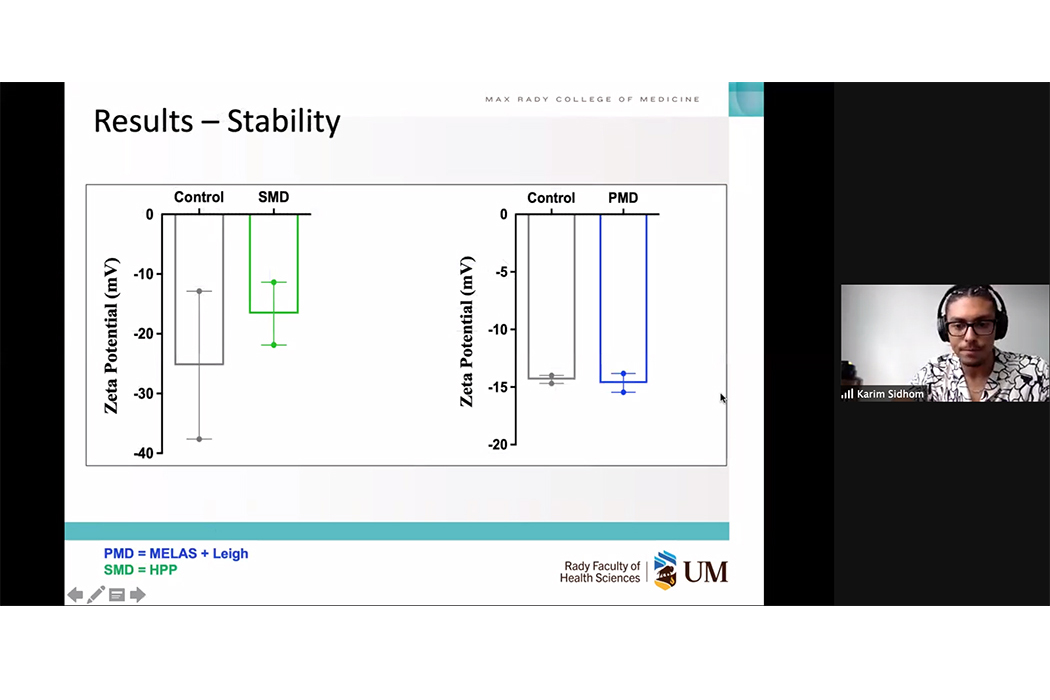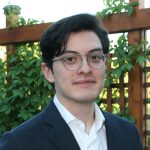
Karim Sidhom, a third-year Max Rady College of Medicine student, presents the results of his B.Sc. (Med.) research project.
Medical students explore world of research
Karim Sidhom was elated when he wrapped up his virtual presentation that capped off his bachelor of science in medicine (B.Sc. (Med.) degree.
“It was an amazing feeling,” said Sidhom, a third-year Max Rady College of Medicine student. “It was amazing, because for me, I’ve been working in Dr. Ayesha Saleem’s laboratory for several years, and in many ways it was a culmination of that effort.”
Sidhom spent the past two summers working on one of the key research projects in the Saleem Lab as part of the B.Sc. (Med.) program. His project looked at using intercellular messages as biomarkers for mitochondrial disease.
The B.Sc. (Med.) experience allows students the chance to develop research skills and gain an understanding of the scientific process while working with a supervising professor.
Saleem, an assistant professor in the Faculty of Kinesiology and Recreation Management, and a research scientist at Children’s Hospital Research Institute of Manitoba (CHRIM) was Sidhom’s primary supervisor for his project, and Dr. Cheryl Rockman-Greenberg, a distinguished professor of pediatrics/child health and biochemistry/medical genetics in the Max Rady College of Medicine, and a clinician scientist at CHRIM, was on his B.Sc. (Med.) committee.
The students spend the summers after their first and second year of the four-year MD program immersed in full-time research. Medical students also have the option of spending one summer conducting research as part of the Med Summer Research Program.
This year, 76 (42 first-year and 34 second-year) students were enrolled in the B.Sc. (Med.) program, and 26 students took part in the Med Summer Research Program. The students receive a $7,500 stipend per summer.
“I wanted to take part because I love research,” Sidhom said. “It’s fun for me. What I liked about the program is that it gives you the framework of research. It provides you the environment and everything you need to succeed and you can bring that to medicine.”
Dr. John Embil, professor of internal medicine and medical microbiology/infectious diseases, Max Rady College of Medicine, and director of the B.Sc. (Med.) and Med Summer Research Program, said that the summer programs foster students’ enthusiasm for research and provides many benefits for the learners.
“Students acquire research, learn scientific writing and scientific presentation skills,” Embil said. “In addition, the students meet and work with scientific investigators with whom they might collaborate in the future. The programs provide students with a rounded exposure to medicine. They will be able to understand the decision-making process and understand scientific discovery and how it occurs. It just adds to their repertoire.”
Embil said that other benefits of taking part in the undergraduate medical student research programs is that learners form relationships with their supervisors who may in the future provide letters of reference. Students also have the opportunity to present their research findings at the undergraduate Medical Student Research Symposium. Embil said that the students’ research may be of sufficient breadth and depth to allow the preparation of a formal manuscript for consideration in a peer reviewed journal.
“All of these facets of the program help to augment a student’s resume which will be a benefit when applying for residencies,” Embil said.
Lauren Burton, a third-year medical student who took part in the Med Summer Research Program, said that understanding what goes into research and how to comprehend scientific articles benefits students when they become physicians.
“Evidence-based practices are a super important part of your learning and eventual job as a physician,” Burton said. “You have to keep up with the research. You have to be able to understand it and be able to evaluate articles and incorporate that into your practice. Having experience actually doing research yourself, carrying out writing papers and giving presentations is a really important part of building your skills set and working towards your eventual career as a physician.”
Burton’s research, which was supervised by Dr. Sarvesh Logsetty, professor of surgery, psychiatry and pediatrics/child health, Max Rady College of Medicine, found that public safety workers (paramedics, police officers, firefighters and correctional officers) have worse outcomes concerning mental health following traumatic workplace injuries than the general population with similar non-workplace injuries. Specifically, the public safety workers had significantly higher rates of depression post-injury, she said.
The summer programs also give students the chance to see if they’d like to pursue research as a career.
Kevin Stein, a second-year medical student who just finished his first summer in the B.Sc. (Med.) program, enrolled because he is considering doing an MD/PhD. He thought the B.Sc. (Med.) program would give him the chance to see if the life of a clinician-scientist was for him.
“I learned a lot about the ins and outs of research,” Stein said. “I really liked working with my supervisor, Dr. Frederick Zeiler, and his lab, so I decided that I’m probably going to do an MD/PhD starting next year.”
Stein’s research is looking at measuring the brain’s ability to maintain a constant blood supply and its relationship with how well a patient with traumatic brain injury recovers. He chose the project because of his interest in neurology and traumatic brain injuries.
The summer research programs are not only advantageous to the students but the supervising professors benefit as well.
“For professors, we get to have motivated students who are focused on working hard to address a question,” Saleem said. “The time the students have is quite limited during the summer, so it’s go, go, go from the moment they get in.”
Now that Sidhom has wrapped up his B.Sc. (Med.), he isn’t leaving research behind.
“The program 100 per cent motivated me to do research in the future.”








